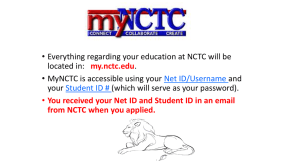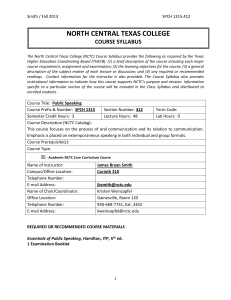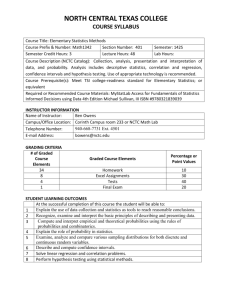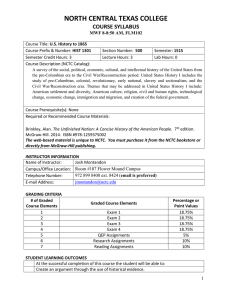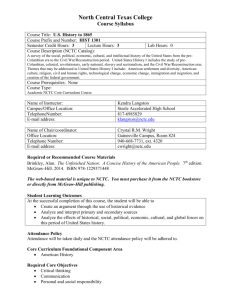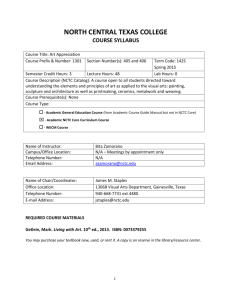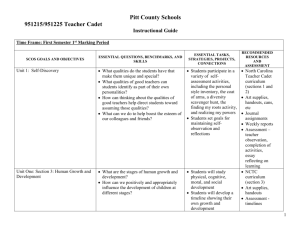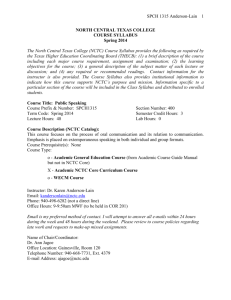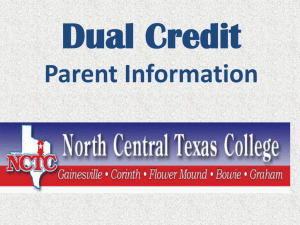course syllabus - North Central Texas College
advertisement
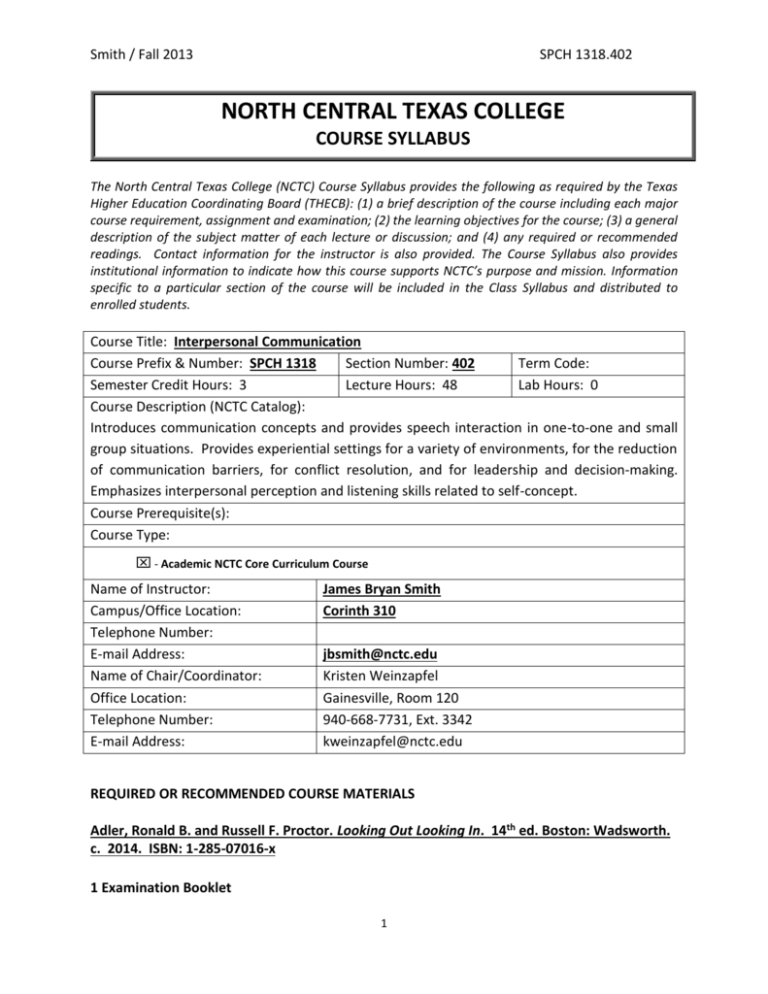
Smith / Fall 2013 SPCH 1318.402 NORTH CENTRAL TEXAS COLLEGE COURSE SYLLABUS The North Central Texas College (NCTC) Course Syllabus provides the following as required by the Texas Higher Education Coordinating Board (THECB): (1) a brief description of the course including each major course requirement, assignment and examination; (2) the learning objectives for the course; (3) a general description of the subject matter of each lecture or discussion; and (4) any required or recommended readings. Contact information for the instructor is also provided. The Course Syllabus also provides institutional information to indicate how this course supports NCTC’s purpose and mission. Information specific to a particular section of the course will be included in the Class Syllabus and distributed to enrolled students. Course Title: Interpersonal Communication Course Prefix & Number: SPCH 1318 Section Number: 402 Term Code: Semester Credit Hours: 3 Lecture Hours: 48 Lab Hours: 0 Course Description (NCTC Catalog): Introduces communication concepts and provides speech interaction in one-to-one and small group situations. Provides experiential settings for a variety of environments, for the reduction of communication barriers, for conflict resolution, and for leadership and decision-making. Emphasizes interpersonal perception and listening skills related to self-concept. Course Prerequisite(s): Course Type: - Academic NCTC Core Curriculum Course Name of Instructor: Campus/Office Location: Telephone Number: E-mail Address: Name of Chair/Coordinator: Office Location: Telephone Number: E-mail Address: James Bryan Smith Corinth 310 jbsmith@nctc.edu Kristen Weinzapfel Gainesville, Room 120 940-668-7731, Ext. 3342 kweinzapfel@nctc.edu REQUIRED OR RECOMMENDED COURSE MATERIALS Adler, Ronald B. and Russell F. Proctor. Looking Out Looking In. 14th ed. Boston: Wadsworth. c. 2014. ISBN: 1-285-07016-x 1 Examination Booklet 1 Smith / Fall 2013 SPCH 1318.402 DEPARTMENTAL PURPOSE STATEMENT The Department of English, Speech, and Foreign Language provides quality instruction to students pursuing their academic and career goals. CORE CURRICULUM COMPONENT AREA: SOCIAL/BEHAVIORAL SCIENCE STUDENT LEARNING OUTCOMES Student Learning Outcome 1. Exhibit understanding of interpersonal theories and principles. 2. Demonstrate the ability to analyze and critique verbal and nonverbal interactions in mediated and face-to-face contexts. 3. Identify perceptual processes as they relate to self and others. 4. Demonstrate critical thinking ability by effectively researching, evaluating, and applying communication theories in oral and/or written assignments. 5. Demonstrate understanding of the relevance of cross-cultural, co-cultural, gender, and age influences on human communication. 6. Demonstrate ability to identify, evaluate, and apply conflict styles and conflict management techniques in dyads and/or groups. 7. Identify types of barriers to effective listening. Last day to Withdraw Student Rights & Responsibilities NCTC Board policy FLB (Local) Student Rights and Responsibilities states that each student shall be charged with notice and knowledge of the contents and provisions of the rules and regulations concerning student conduct. These rules and regulations are published in the Student Handbook published in conjunction with the College Catalog. All students shall obey the law, show respect for properly constituted authority, and observe correct standards of conduct. Scholastic Integrity Scholastic dishonesty shall constitute a violation of college rules and regulations and is punishable as prescribed by Board policies. Scholastic dishonesty shall include, but not be limited to cheating on a test, plagiarism, and collusion. Financial Aid, Scholarships, and Veterans Services The Financial Aid Office is responsible for administering a variety of programs for students who need assistance in financing their education. The first step for financial aid is to complete a FAFSA. For more information, please visit your nearest Financial Aid Office. 2 Smith / Fall 2013 SPCH 1318.402 STUDENT SUPPORT SERVICES The Office for Students with Disabilities (OSD) provides accommodations Disability Accommodations for students who have a documented disability. A disability is anything that can interfere with learning, such as a learning disability, psychological challenge, physical illness or injury. Accommodations may include extra time on tests, tests in a distraction reduced environment, volunteer note taker in class, etc. On the Corinth Campus go to room 170 or call 940-498-6207. On the Gainesville Campus go to room 110 in the Administration (100) Building or call 940-668-7731 ext. 4321. North Central Texas College is committed to both the spirit and letter of federal equal opportunity legislation, including the Americans with Disabilities Act (ADA) of 1990, ADA Amendments Act of 2009, and Section 504 of the Rehabilitation Act of 1973 (P.L. 93-112). Student Success The Student Success Center is designed to help all students at NCTC develop tools to achieve their academic goals. This program also links students to FREE tutoring, including a Writing Center, a Math Lab, and free 24/7 online tutoring and helps new students acclimate to college by providing computer lab services for prospective students. All students are invited to visit the Student Success Center on the Corinth Campus go to rooms 170, 182, or 188; on the Gainesville Campus go to rooms 114 or 111; on the Flower Mound Campus go to room 111, on the Bowie Campus go to room 124. Tobacco-Free Campus NCTC restricts the use of all tobacco products including cigarettes, cigars, pipes and smokeless tobacco on campus property. NCTC is aware that tobacco use influences underage students which cumulates unsightly tobacco litter and interferes with assuring clean air for all who come to NCTC. NCTC recognizes the health hazards of tobacco use and of exposure to second hand smoke. Information on a tobacco cessation program is available for students, faculty, staff who wish to stop using tobacco products. We would like to "thank you" for your help in making our campuses Tobacco-Free. For questions or concerns please contact the Office of Vice President of Student Services at 940.668.4240. Attendance and Participation Learning is a social process so in order for this class to be successful, your attendance and participation are imperative. We will conduct this class as a seminar, performing the roles of teachers and learners simultaneously. This is possible only if everyone prepares in advance for class by giving thoughtful attention to the assigned readings, assuming a constructive role in class discussions, asking questions, thoughtfully attending to the ideas of others, and sharing your own insights. 3 Smith / Fall 2013 SPCH 1318.402 I understand that you have a life outside of the classroom and that emergencies do take place, therefore I allow 1 free absence. For each day beyond 1 that you miss, 40 points will be deducted from your final grade. If you are absent from class, it is your responsibility to learn about assignments or any class work missed, ideally from other members of the class. If that is impossible for some reason, you are certainly free to then contact me. A documented absence does not exempt students’ academic requirements. Excessive absences, even if documented may result in a student failing a course. Course Policies You are responsible for turning work in on time. Late work will not be accepted. Assignments are always due at the beginning of class. If you are unable to attend class on the day an assignment is due, or if there is any remote chance your car might break down, you might get stuck in traffic, your printer won’t work, etc., you must email that assignment to me before the end of our class to avoid penalties for lateness. All assignments (unless otherwise noted) must be typed, single spaced 10 point Cambria font, header with first and last name, course and section number – the header should be in the HEADER. Should you miss class due to an excused absence, you must complete the missed assignment and turn it in no later than the beginning of the next class period. You may also turn these in early, recommended. Critical Thinking This class encourages critical thinking, or the ability to perceive information, thoroughly analyze it, and then question particular problematic components of it. This means you are encouraged to ask questions and thoughtfully contribute to class discussions. Of course, this is to be done in an academically encouraging and respectful manner. Absolutely no instances of personal attacks will be tolerated. This includes any and all racist, sexist, homophobic, ageist, etc. language and/or comments. If at any time you feel violated or uncomfortable about anything said or discussed in class, please discuss it with your instructor. Grading Assignments All presentations and assignments are based upon a point system. Students will receive a thorough description of requirements for all assignments before they are due, as well as a detailed explanation of all assignments and grading procedures. Your work will be assessed in terms of concept comprehension and skill mastery. With regard to the skill mastery assessments, it must be stressed that although objective standards exist that can be used to determine the quality of an oral communication skill, a certain amount of subjectivity is inherent in the determination of the degree to which such standards are met. It is your responsibility as the student to keep up with points accrued throughout the semester. Final points will be available at the end of the course. Please note: Please do not contact your instructor via e-mail or phone in an attempt to receive any grades, points or extemporaneous grading issues as course policy does not allow these transmissions. If you have any questions regarding point amounts, please e-mail your instructor with the request and they will bring that information to you in class. After a graded assignment has been returned to you, you must wait a minimum of 24 hours before contacting your instructor about a possible grade dispute. After a graded assignment has been returned to you, you have a maximum of 1 week to contact your instructor regarding a possible grade dispute. Disclaimer This syllabus is intended to serve as a guideline for Speech 1318. Both NCTC and your professor reserve the right to make modifications in content, schedule, and requirements as necessary to promote the optimal educational experiences within prevailing conditions affecting the course. 4 Smith / Fall 2013 SPCH 1318.402 COURSE REQUIREMENTS, EVALUATION METHODS AND GRADING CRITERIA Grade Scale A: (excellent, outstanding) B: (good) C: (average) D: (barely passing) F: (failing) 900-1000 800-899 700-799 600-699 below 600 90-100% 80-90% 70-80% 60-70% 59% and below Grade Tracking Tool Assignment Point Value Your Score Roundtable Interview 100 ______________ Analyses Identity Narrative 100 ______________ Film Analysis 50 ______________ Relational Analysis 100 ______________ Reflection Journals 150 ______________ Quizzes 150 ______________ Midterm Exam 100 ______________ Final Exam 150 ______________ Participation 100 ______________ Total: 1000 ______________ 5 Smith / Fall 2013 SPCH 1318.402 GENERAL DESCRIPTION OF SUBJECT MATTER FOR EACH LECTURE/DISCUSSION Topic Wk 1 Wk 2 Wk 3 Wk 4 Wk 5 Wk 6 Wk 7 Wk 8 Wk 9 Wk 10 Wk 11 Wk 12 Wk 13 Wk 14 Wk 15 Wk 16 8/26 Introduction 9/2 NO CLASS 9/9 Comm. Perspectives 9/16 Identity / The Self 9/23 Perception / The Other 9/30 Language / Meaning 10/7 Culture / World 10/14 MID TERM EXAM 10/21 Silence / Presence 10/28 Listening / Hearing 11/4 Relations / Dialectic 11/11 Intimacy / CPR 11/18 Conflict / Maintenance 11/25 Advocacy / Change 12/2 INTERVIEW 12/9 FINAL EXAMINATION Ch. – Chapter from assigned textbook; Readings Assignments Ch. 1, Sup. 1 Ch. 2, Sup. 2 Ch. 3 Ch. 5, Sup. 3 Sup. 4 Ch. 4 Ch. 6, Sup. 5 Ch. 7, Sup. 6 Ch.8, Sup. 7 Ch. 9, Sup. 8 Ch. 11 Ch. 10, Sup. 9 Review @ 7 PM Identity Narrative Draft due Identity Narrative Revised due Midterm Exam Film Analysis due Relational Analysis due Roundtable Interview Cumulative Exam Sup. – Supplemental reading to be provided by Instructor. 6
